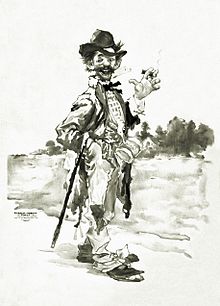This is an old revision of this page, as edited by 2603:3005:b0b:1a00:9910:5a7f:c273:51ed (talk) at 17:43, 10 November 2023 (bjhb hk→History). The present address (URL) is a permanent link to this revision, which may differ significantly from the current revision.
Revision as of 17:43, 10 November 2023 by 2603:3005:b0b:1a00:9910:5a7f:c273:51ed (talk) (bjhb hk→History)(diff) ← Previous revision | Latest revision (diff) | Newer revision → (diff) Long-term homeless person This article is about vagrants who travel on foot. For other uses, see Tramp (disambiguation).
A tramp is a long-term homeless person who travels from place to place as a vagrant, traditionally walking all year round.
Etymology
Tramp is derived from a Middle English verb meaning to "walk with heavy footsteps" (cf. modern English trample) and "to go hiking".
In Britain the term was widely used to refer to vagrants in the early Victorian period. The social reporter Henry Mayhew refers to it in his writings of the 1840s and 1850s. By 1850 the word was well established. In that year Mayhew described "the different kinds of vagrants or tramps" to be found in Britain, along with the "different trampers' houses in London or the country". He distinguished several types of tramps, ranging from young people fleeing from abusive families, through to people who made their living as wandering beggars and prostitutes.
In the United States, the word became frequently used during the American Civil War, to describe the widely shared experience of undertaking long marches, often with heavy packs. Use of the word as a noun is thought to have begun shortly after the war. A few veterans had developed a liking for the "call of the road". Others may have been too traumatised by war time experience to return to settled life.
History
Main article: Vagrancy
Meaning promiscuous woman
Perhaps because female tramps were often regarded as prostitutes, in the United States the term "tramp" came to refer to a promiscuous woman. However, this is not a global usage. According to Australian linguist Kate Burridge, the term shifted towards this meaning in the 1920s, having previously predominantly referred to men, it followed the path of other similar gender neutral words (such as "slag") to having specific reference to female sexual laxity.
The word is also used, with ambiguous irony, in the classic 1937 Rodgers and Hart song "The Lady Is a Tramp", which is about a wealthy member of New York high society who chooses a vagabond life in "hobohemia". Other songs with implicit or explicit reference to this usage include The Son of Hickory Holler's Tramp and Gypsys, Tramps & Thieves.
Country specific definitions
The US State of Mississippi, until 2018, had a specific definition for "tramps", which was a criminal offense.
"Any male person over 16 years of age, and not blind, who shall go about from place to place begging and asking subsistence by charity, and all who stroll over the country without lawful occasion, and can give no account of their conduct consistent with good citizenship, shall be held to be tramps. Every person, on conviction of being a tramp, shall be punished by a fine of not more than $50, or imprisonment in the county jail not more than one month, or both."
In other languages
"Clochard" redirects here. For the 1932 French film, see Clochard (film).In French, "clochard" is a term for the homeless, especially in French cities. The term is often associated with the romanticizing image of a person who has given up his bourgeois existence for a free life under the Seine bridges in Paris.
See also
- Backpacker tourism, a form of low-cost, independent travel
- Bum (disambiguation)
- Christopher McCandless, an American hiker known as "Alexander Supertramp" and the subject of the biography Into the Wild.
- Down and Out in Paris and London, a memoir of George Orwell's experiences as a tramp in London
- Swagman, an Australian itinerant labourer
- The Tramp, a famous comic character created by Charlie Chaplin
- Tramp art, a style of woodworking
- Tramp trade, ships with no fixed itinerary that contract on a voyage-by-voyage basis.
- W. H. Davies, a British tramp and later author of The Autobiography of a Super-Tramp in the UK
References
- "Victorian London - Publications - Social Investigation/Journalism - The Morning Chronicle : Labour and the Poor, 1849-50; Henry Mayhew - Letter XXX". victorianlondon.org.
- DePastino, Todd (2005). Citizen Hobo: How a Century of Homelessness Shaped America. University of Chicago Press. pp. 1–48. ISBN 0226143791.
- "tramp definition, meaning - what is tramp in the British English Dictionary & Thesaurus - Cambridge Dictionaries Online". cambridge.org.
- Kate Burridge, Blooming English: Observations on the Roots, Cultivation and Hybrids of the English Language, Cambridge University Press, 2004, p.60.
- Gary Marmorstein, A Ship Without A Sail: The Life of Lorenz Hart, Simon and Schuster, 2013, p.298.
- "Mississippi HB668 | 2018 | Regular Session".
- Gates, Jimmie E. "Did you know Mississippi still can penalize you for being homeless?". The Clarion-Ledger. Retrieved 2020-10-23.
- "Clochard". Online-Duden.
- Steinhilber, Jochen (1996). Frank Deppe; Hans-Jürgen Bieling (eds.). Schlanke Marianne? (in German). VS Verlag für Sozialwissenschaften. p. 109. ISBN 3-8100-1653-5.
{{cite book}}:|work=ignored (help)
External links
- BBC Wales feature on tramps as gentlemen of the road from 1964
- Tramp's signs, symbols and slang
- "Waiting for a Train" Excerpt from Douglas Harper's Good Company: A Tramp Life (2006) ISBN 978-1-59451-184-4
- In Strange Company, by James Greenwood, 1874 - A Tramp to the Derby
- In Search of the American Hobo at virginia.edu